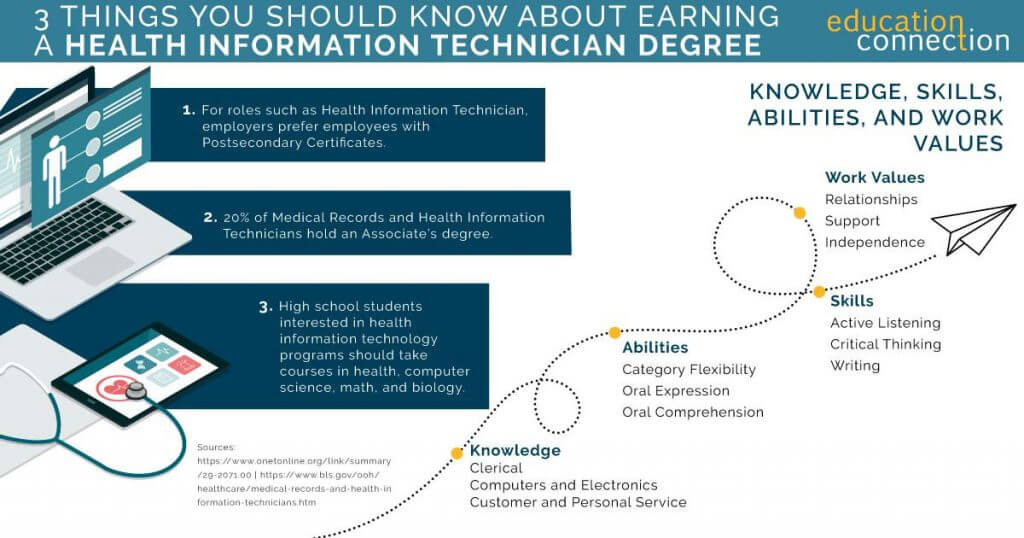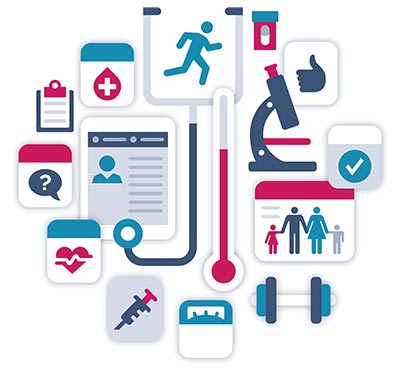WHAT IS A HEALTH INFORMATION TECHNICIAN?
Wondering what you would do as a Health Information Technician? Or a Medical Records Tech? As a Health Information Technician(HIT), you work with healthcare data. As an HIT, you don’t treat patients. But, you do make sure doctors and nurses have the correct information at their fingertips.
So, what exactly would your work entail? Well, you would have a few different roles.
First of all, as an HIT, your main job is to document patients’ information. As such, you would document each person’s medical history. Then, you would track symptoms and test results. You would organize and manage this data on paper. Then, you would enter it into electronic filing systems. Your goal is to make sure the data you gather is accurate. You also must keep the data secure. Additionally, you would need to be able to find and use the data. This is so you can access it for billing and other purposes.
Sometimes, as an HIT, you would specialize in a particular role. For instance, you could focus on medical coding. As such, you would review patient data. Then, you would code it for health insurance reimbursement. In this role, you are often a key link between healthcare providers and billing offices.

HEALTH INFORMATION TECHNICIANS: A RANGE OF POSSIBILITIES
HIT Responsibilities | Where HITs Work | Types of HITs |
|
|
|
WHAT DEGREE DO YOU NEED TO BE AN HIT?
Are you wondering what degree you need to be an HIT? We will go over that for you. Usually, as an HIT, you would need a postsecondary certificate. Or, you could earn an associate’s degree from a Health Information Technician School. Both programs help you learn the ropes of healthcare data. You will learn how it’s used. Either program could prepare you to pursue certification, like RHIT.
HIT ASSOCIATE’S DEGREE PROGRAMS
What could you expect out of an A.S. degree program? Well, an A.S. program would give you an overview of the field and an introduction to the HIT career path. The program would teach you some key skills. For example, you could study topics such as health information management. Or, you could study medical coding. Also, you will learn healthcare terms. You will study practices, and ethical concerns. Most programs will have you touch upon the biological sciences as part of your course work.
Do you want a broader approach? You would have the chance to expand your education more generally, as well. As such, you may take general education courses like Psychology or Communications. In these courses, you could learn the soft skills you need for your career.
You can look for A.S. degree programs like:
- Associate in Applied Science (A.A.S.) in Health Information Technology
- HIT A.S. Degree
- Associate of Science (A.S.) in Medical Billing & Coding
1
Southern New Hampshire University
- Take advantage of some of the nation’s most affordable tuition rates, while earning a degree from a private, nonprofit, NEASC accredited university
- Qualified students with 2.5 GPA and up may receive up to $20K in grants & scholarships
- Multiple term start dates throughout the year. 24/7 online classroom access.
Popular Programs
Business Administration, Psychology, Information Technology, Human Services…
2
University of Arizona Global Campus
- 99% of University of Arizona Global Campus students study online
- University of Arizona Global Campus offers affordable tuition, so college is accessible to many students.
- he University of Arizona Global Campus (formerly Ashford University) is accredited by WASC Senior College and University Commission (WSCUC)
Available Programs
Accounting and Finance, Information Technology, Political Science…
3
Western Governors University
- Award-winning programs created to help you succeed.
- A quality education doesn’t have to be expensive. Earn an accredited degree for less.
- Programs start monthly – Apply free this week!
Sponsored Schools
HIT COURSES
Medical Terminology: In this course, you will learn to identify medical terms, define the body structure and its systems, cavities, planes, and positions, and understand the importance of medical terminology in the healthcare profession.
Anatomy and Physiology: Learn about the cells, chemistry, and tissues of the integumentary, skeletal, muscular, nervous, and endocrine systems.
Communication: In this course you may study behaviors that convey a caring attitude. You could cover how organizations can create a patient centric environment and foster supportive, therapeutic, and caring language.
Classification and Coding Systems: These coding courses introduce the classification system used by health care facilities, physicians and insurance companies.
Healthcare Reimbursement: In this course you may cover health insurance products and managed care approaches to the financing and delivery of healthcare services.
Healthcare Statistics: In this course, you could explore the statistical methods used in health professions. You may review parametric and nonparametric techniques and explore the purpose, assumptions, selection, and interpretation of statistics.
HOW LONG DOES IT TAKE YOU TO BECOME A HEALTH INFORMATION TECH?
Are you interested in earning an A.S. degree in health information technology? Doing so will usually take you about two years. That is, if you are a full time student. These programs, you will find, tend to range from 61 to 74 credits.
What if you don’t have as much time? Well, a certificate in medical coding may be less demanding for you. It may call for you to meet anywhere from 19 to 34 credits. So, you might be able to earn a certificate in less time than an associate’s degree.

Health Information Technician Schools & Programs
| School | # of Credits | Start Dates | Min Months to Complete |
| Trident University | 36 | Multiple | 12 |
Cost to Become a Health Information Technician
Are you wondering about cost for you to pursue this path? Well, your biggest cost will likely be your education program. In 2022, you will find, students in this field paid median in state public tuition of $3,922. For out of state private colleges, you could expect to pay around $25,436.
Below, you can compare tuition from a few other schools:
| School | # of Credits | Cost Per Credit | Total Tuition Cost |
| Trident University | 36 | $1,158 (per course) | $13,900 |
HEALTH INFORMATION TECHNICIAN SCHOOLS
DataUSA tells us, that 544 schools offered HIT programs in the 2022 school year. From those schools, you will see, 10,010 degrees were awarded to students. The majority of them, you will find, are Associate’s degrees.
| School | 2022 Degrees awarded | 2023/24 Tuition (out of state unless *) |
| University of Phoenix Arizona | 1,027 | $9,552* |
| DeVry University Illinois | 2,222 | $17,488* |
| Miller Motte College Wilmington | 199 | $25,240* |
| St Petersburg College | 132 | $9,286 |
| Rasmussen University-Florida | 111 | $15,117 |
| Schoolcraft Community College District | 48 | $7,906 |
| Rasmussen University-Minnesota | 41 | $10,899* |
Estimated for full time, beginning undergrad students





